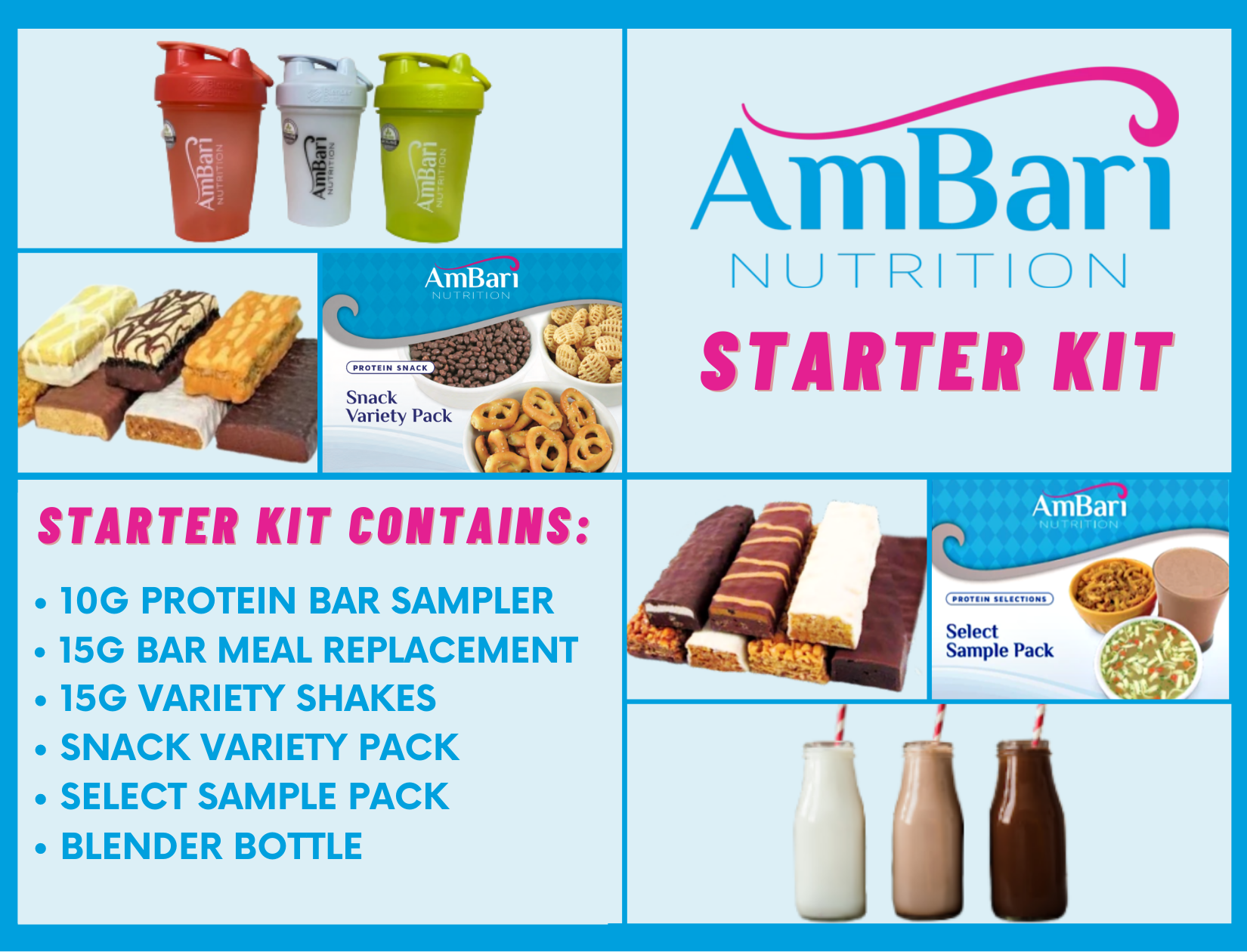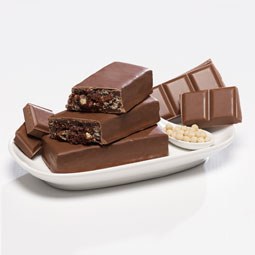Menu
Your cart is empty
Looks like you haven't added anything to your cart yet
Bariatric Protein Bars
Bariatric Protein Bars
Our collection of bariatric protein bars brings you the perfect balance of nutrition and taste. These bars are a great choice for anyone looking to manage their weight, especially after weight loss surgery.
Each bar is packed with 10-15 grams of high-quality protein to help maintain muscle and keep you feeling full. Many of the bars also contain important vitamins, minerals, and fiber to support your overall health, digestion, and blood sugar control.
We’ve handpicked these bars to make sure you’re getting the best options for your weight loss journey. Plus, with a variety of delicious flavors, you’ll never feel like you’re missing out on a tasty treat.
Brand
Dietary Concern
Product Type
ChocoRite All-Natural Bars

Quick View
16% off

ChocoRite All-Natural Bars
- Sale price
- $7.95
- Regular price
- $9.45
After bariatric surgery, patients usually need to follow a high-protein, low-carb diet to support weight loss, maintain muscle, and aid healing. Meeting daily protein goals can be hard because of reduced food intake, and that’s where protein bars can help.
Bariatric protein bars are an easy way to boost your protein intake. But not all protein bars are the same. The best bars for weight loss surgery patients are low in sugar, high in quality protein, and taste great!
How to Choose the Right Protein Bar After Weight Loss Surgery
As a bariatric patient, choosing the right protein bar matters. Here are some tips to help you make the best choice:
- Check the Protein Content: Look for bars with at least 10g of protein. This will help you meet your daily needs.
- Type of Protein: Protein bars use different types like Whey, Soy, Casein, Pea, or Rice. Each has its benefits.
- Watch Out for Sugar: Many bars have too much sugar, which can slow weight loss. Stick to low-sugar options.
- Consider the Calories: Some bars are high in calories. Make sure to fit them into your daily calorie goal.
- Taste Matters: Find a bar that you enjoy! Try variety packs to discover your favorite flavors.
- Read Reviews: Check what other bariatric patients are saying in reviews to help guide your choice.
Types of Protein in Bariatric Protein Bars
| Protein Type | Pros | Cons |
|---|---|---|
| Whey Protein |
|
|
| Casein Protein |
|
|
| Soy Protein |
|
|
| Pea Protein |
|
|
| Rice Protein |
|
|
The 10 Best Bariatric Protein Bars
Bariatric protein bars are a bit smaller because of the reduced stomach size after surgery. They usually have 140-180 calories and 10-15 grams of protein. Here are some of the best options, based on sales, reviews, and customer feedback:
- Vanilla Shortbread Bars: Tastes like a shortbread cookie. 15g of protein, 5g of fiber, and only 160 calories.
- Divine Caramel Sea Salt Bars: A sweet and salty snack. 15g of protein, 5g of fiber, and 150 calories.
- Fluffy Nutter Bar: Peanut butter and marshmallow flavor. 15g of protein, 7g of fiber, and only 160 calories.
- S'mores Chocolate Marshmallow Bar: A chocolate and marshmallow combo with 15g of protein, 160 calories.
- Frosted Lemon Meringue Bars: Light and refreshing, with 10g of protein and 150 calories.
- Chocolate Caramel Wafer Bars: A crispy chocolate and caramel treat. 15g of protein, 160 calories.
- Proti-Fit Wafer Squares: Light, fluffy wafers with 15g of protein, and only 200-210 calories.
- Fudge Graham Bars: Fudge and graham flavor. 15g of protein, 160 calories.
- White Chocolate Caramel Bars: Sweet caramel and white chocolate with 15g of protein, 160 calories.
- Protein Bar Variety Pack: Can’t choose? Try the variety pack with different flavors, each bar offering 15g of protein.
Customer Reviews
Here's a few verified reviews taken from our site:
Marylu Hartsell
05/14/2024
Delicious! We’ve been looking for a delicious and healthy meal replacement bar, and this is it. Highly recommended! Even contains electrolytes.
Jeanette F.
08/23/2023
Love the variety pack of protein bars! Great selection options and easy to grab on the go!
P. M.
08/17/2023
Hits the spot! The white chocolate vanilla caramel bar is not only very filling, but it also hits the spot when you are craving something sweet!
Frequently Asked Questions
How soon after bariatric surgery can I start eating protein bars?
It's important to follow your surgeon's guidelines, but typically, solid foods like protein bars are introduced 4-6 weeks after surgery. Always consult with your healthcare provider before adding new foods to your diet.
How many protein bars can I eat per day?
The number of protein bars you can eat depends on your individual nutritional needs and your stage of recovery. Generally, 1-2 bars per day can be incorporated into your diet plan. Always prioritize whole foods and use protein bars as supplements, not meal replacements.
Are these protein bars suitable for dumping syndrome?
Many of the recommended protein bars are formulated to be low in sugar and high in protein, which can help prevent dumping syndrome. However, individual responses may vary. Start with a small amount and monitor your body's reaction.
Can I use these protein bars as meal replacements?
While these protein bars can be a convenient snack or part of a meal, they shouldn't regularly replace whole food meals. They're designed to supplement your diet and help you meet your protein goals, not to be your primary source of nutrition.
What if I can't tolerate whey protein?
If you're lactose intolerant or sensitive to whey, look for bars made with alternative proteins like soy, pea, or rice protein. Many of the recommended bars come in varieties with different protein sources.
Conclusion
For weight loss surgery patients, sticking to a balanced bariatric diet can be tough. Bariatric protein bars make it easier by providing protein and fiber to keep you full and satisfied. With plenty of flavors to choose from, these bars are a great way to stick to your plan without feeling deprived. Remember, long-term success comes from making sustainable eating changes, and these protein bars can help you along the way.
Author: Carrie H. Carrie is a passionate health and nutrition writer who transforms complex medical research into accessible, evidence-based content to empower readers to make informed choices about their wellbeing. With a background in science and a dedication to helping others live healthier lives, she provides thoughtful analysis of the latest studies and practical, actionable advice readers can apply to their own lives. |
Reviewed By: Dr. Kevin Huffman Dr. Huffman is an accomplished board-certified bariatric physician with extensive clinical experience and expertise in treating obesity. He has trained countless healthcare providers and founded American Bariatric Consultants to develop highly sought-after protocols, training materials and continuing education used widely by medical societies, hospitals and physicians. Dr. Huffman's impact reaches far beyond direct patient care, as he actively prepares the next generation of physicians to achieve board certification in bariatrics, thereby exponentially expanding access to this vital medical treatment. |
- Choosing a selection results in a full page refresh.










































